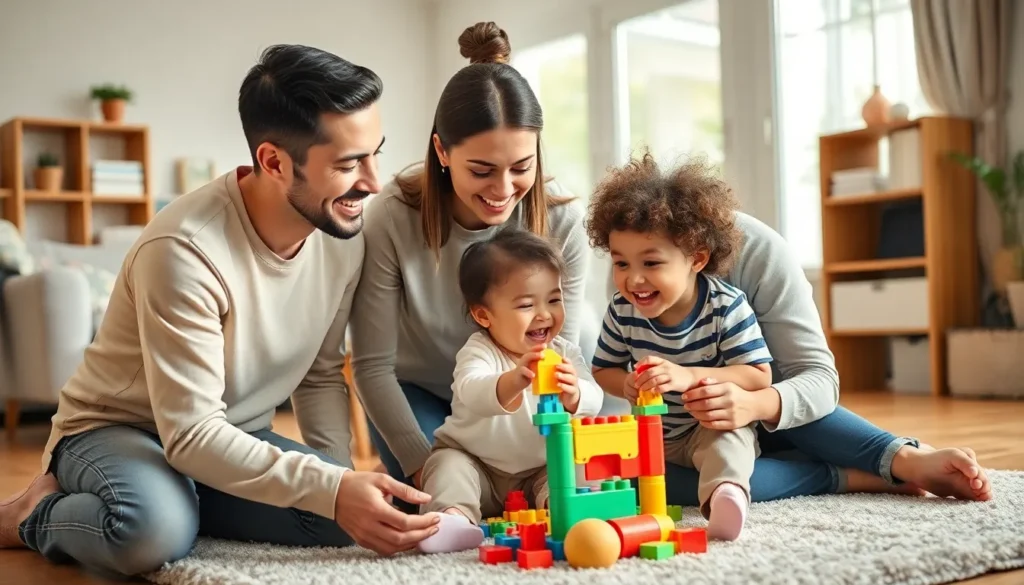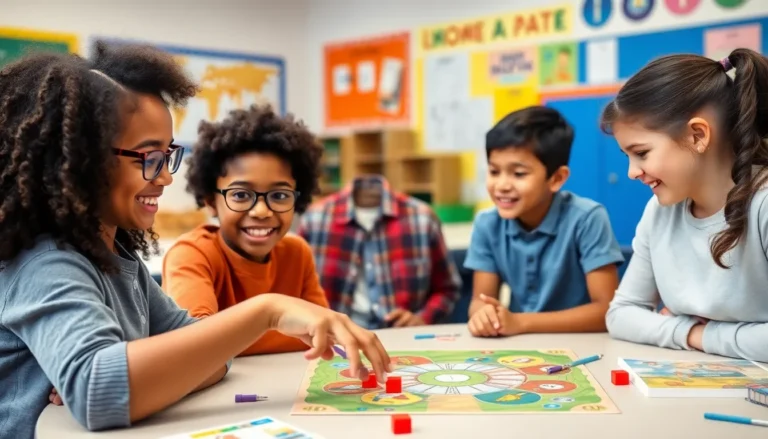Navigating the world of co-parenting can feel like trying to assemble a toddler’s toy without the instructions—confusing and often messy. When you throw a spirited toddler into the mix, things can get even trickier. Yet, with a sprinkle of humor and a dash of teamwork, co-parenting can transform into a rewarding adventure rather than a chaotic circus.
Imagine juggling nap times, snack schedules, and that ever-elusive bedtime routine while maintaining a civil relationship with your co-parent. It sounds daunting, but it’s entirely possible. With the right strategies and a positive mindset, co-parents can create a nurturing environment that helps their little ones thrive. After all, who knew that sharing parenting duties could also mean sharing the laughs—and the occasional tantrum? Get ready to explore essential tips and insights that make co-parenting with toddlers not just manageable, but downright enjoyable.
Table of Contents
ToggleUnderstanding Co-Parenting
Co-parenting involves two parents working together to raise their child after separation or divorce. Effectively managing this relationship is crucial, especially with a spirited toddler in the picture.
Definition of Co-Parenting
Co-parenting refers to a shared parenting arrangement following the ending of a romantic relationship. In this context, both parents remain involved in their child’s life, focusing on shared responsibilities and caring for the child’s well-being. Effective co-parenting fosters supportive communication, collaboration on decisions, and consistency in discipline. It emphasizes the importance of maintaining a unified front to minimize confusion for the child. By creating a stable environment, co-parents enable their toddler to thrive emotionally and developmentally.
Importance of Effective Co-Parenting
Effective co-parenting plays a critical role in a child’s overall development. Consistent routines and aligned parenting styles create a sense of stability and security for toddlers. Research shows that children exposed to cooperative co-parenting are less likely to experience behavioral problems. Positive co-parenting reduces conflict, which enhances emotional well-being. Furthermore, it nurtures healthy relationships with both parents, ensuring the child feels loved and supported. Establishing clear communication also helps manage any disagreements, leading to a more harmonious environment for the toddler.
Co-Parenting Dynamics with Toddlers

Navigating co-parenting with toddlers presents unique challenges. Effective communication acts as a cornerstone for success in this partnership.
Communication Strategies for Parents
Establishing open lines of communication fosters understanding. Regular check-ins between parents facilitate the sharing of insights about the child’s development and behaviors. Text messaging or parenting apps create a quick way to exchange information. When discussing concerns, use a calm tone and focus on the child’s needs rather than personal grievances. A collaborative approach builds mutual respect, strengthening the parenting partnership. Sharing positive updates reinforces the child’s achievements and well-being. Frequent discussions about schedules and activities minimize misunderstandings and ensure both parents are aligned.
Establishing Consistent Routines
Consistency in routines promotes stability for toddlers. Shared schedules clarify expectations, helping children feel secure. Setting regular meal times and bedtime routines contributes to better sleep and overall mood. Parents should synchronize approaches to discipline, ensuring boundaries remain clear. Playtime and learning activities need structure and predictability. Keeping a visual schedule can aid in transitions between parents’ homes. A unified front allows children to adapt more smoothly to changes, reducing potential anxiety. Routine collaboration between parents in daily activities cultivates a sense of teamwork and continuity.
Challenges in Co-Parenting Toddlers
Co-parenting toddlers presents unique challenges that require understanding and adaptability.
Emotional Impact on Toddlers
Emotional well-being significantly influences toddlers’ behavior and development. When parents navigate a separation, toddlers may experience feelings of anxiety, uncertainty, or sadness. Consistent communication between co-parents helps alleviate emotional distress, providing reassurance to the child. Engaging in open discussions about feelings fosters a supportive atmosphere. Establishing a secure attachment with each parent enhances emotional resilience. Parents must prioritize the child’s emotional needs, ensuring they feel loved and valued in both households. Regular joint activities provide comfort, reinforcing family connections. Acknowledging and validating a toddler’s emotions aids in creating stability during transitions.
Navigating Conflicts Between Parents
Navigating conflicts between parents requires a proactive approach. Prioritizing the child’s needs creates a shared focus, reducing personal disagreements. Collaborating on decisions helps ensure consistency between households. When disagreements arise, parents should address issues calmly and respectfully, steering clear of confrontations in front of the child. Utilizing parenting apps streamlines communication, allowing for quick resolution of misunderstandings. Setting aside dedicated time for co-parenting discussions encourages teamwork and reinforces mutual respect. Developing conflict resolution strategies can lead to a cooperative environment, ultimately benefiting the child’s emotional growth and development.
Supportive Strategies for Successful Co-Parenting
Successful co-parenting relies on shared strategies that ensure children thrive amid family changes. By utilizing effective approaches, parents can navigate toddler challenges together.
Collaborative Decision-Making
Collaborative decision-making strengthens the co-parenting relationship. Engaging in discussions about routines, discipline, and activities helps prevent misunderstandings. Each parent can share their perspectives, ultimately leading to well-informed choices that benefit the child. It’s essential to identify areas of agreement and work through disagreements constructively. Weekly check-ins serve as great opportunities for both parents to align on plans and expectations. Using shared digital tools can simplify this process, allowing instant access to vital information. Establishing a united front fosters stability for toddlers, reinforcing their sense of security and belonging.
Engaging Extended Family and Friends
Engaging extended family and friends can enhance the co-parenting experience. Involving trusted adults creates a broader support network for children. Grandparents and close friends often provide additional love and stability, which are crucial during transitions. Encouraging open communication among everyone involved ensures that everyone is on the same page concerning care and support. Regular family gatherings can also strengthen ties, benefiting the child’s emotional health. Uniting family resources not only enriches a toddler’s life but also promotes accountability among adults, fostering a cooperative environment.
Co-parenting toddlers presents unique challenges but also offers rewarding opportunities for growth and connection. By prioritizing effective communication and teamwork parents can create a nurturing environment that benefits their child’s emotional and developmental needs. Establishing consistent routines and collaborating on decisions fosters stability while minimizing confusion for toddlers.
Navigating this journey together not only strengthens the co-parenting relationship but also enriches the child’s life. With patience humor and a proactive approach parents can turn potential chaos into a harmonious partnership that supports their little one’s well-being.



